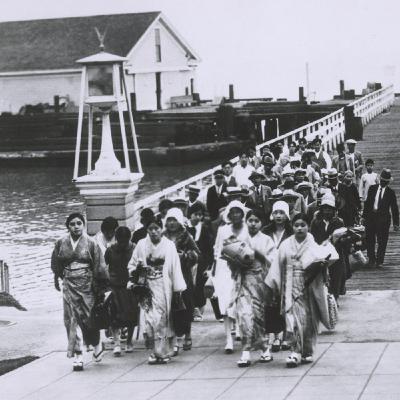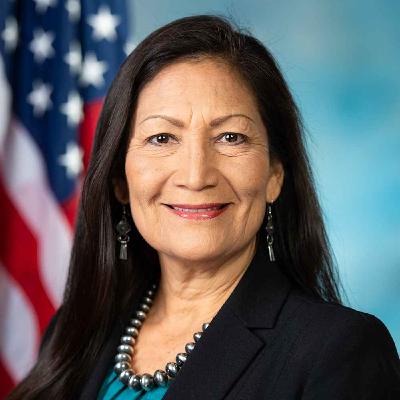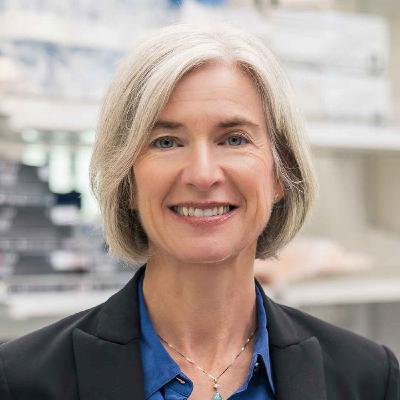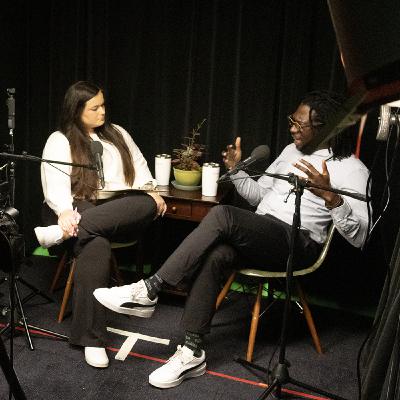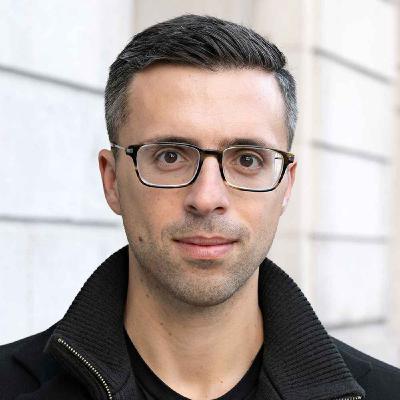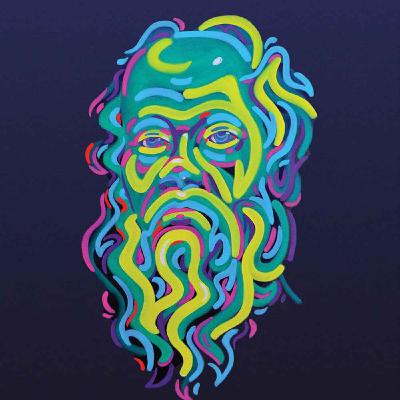Discover Berkeley Talks
Berkeley Talks

Berkeley Talks
Author: UC Berkeley
Subscribed: 91Played: 2,035Subscribe
Share
© All rights reserved
Description
A Berkeley News podcast that features lectures and conversations at UC Berkeley
Hosted on Acast. See acast.com/privacy for more information.
241 Episodes
Reverse
Before there was the Chinese Exclusion Act, there was the Page Act. Passed in 1875 amid growing anti-Chinese sentiment in the 19th century, the Page Act was one of the first national immigration laws in the United States. It targeted several categories of people, including contract laborers from Asia, women brought in for sex work and certain convicted criminals. In practice, however, it functioned mainly to restrict Chinese and other Asian women from entering the country.“It had enormous implications for the issues of race, gender and labor in U.S. immigration history and Asian American history,” says UC Berkeley history professor Hidetaka Hirota, who moderated a campus discussion in April to mark the Page Act’s 150th anniversary.In this Berkeley Talks episode, a panel of Berkeley scholars unpack how the Page Act helped institutionalize racially targeted exclusion and gendered surveillance at the border, and how it laid the groundwork for the 1882 Chinese Exclusion Act and later immigration laws. They also challenge the enduring myth of the “white bootstrapping ethnic,” supposedly living “the right way” without state support, showing instead how immigration and welfare regimes were structured to advantage European newcomers while systematically excluding Asians and other people of color.Panelists include Catherine Ceniza Choy, professor of ethnic studies; Cybelle Fox, professor of sociology; Leti Volpp, professor of law; and Hidetaka Hirota, associate professor of history, who moderated the conversation. The event, which took place on April 23, was hosted by Berkeley’s Social Science Matrix and was co-sponsored by the Berkeley Interdisciplinary Migration Initiative, the Department of Sociology, the Department of History, the Department of Ethnic Studies, the Asian American Research Center and the Center for Race and Gender.Watch a video of the discussion.Listen to the episode and read the transcript on UC Berkeley News (news.berkeley.edu/podcasts/berkeley-talks).Music by HoliznaCC0.Photo from the National Archives. Hosted on Acast. See acast.com/privacy for more information.
When UC Berkeley Professor Randy Schekman was 12, he scooped up a jar of pond scum and examined it under his toy microscope.“I just could not believe the world that was revealed,” he said during a campus event earlier this month. “This complex set of creatures that you can't see with your naked eye, and yet are moving and somehow mechanically independent, and able to do amazing things. And this was so fascinating.”Schekman went on to become a professor of molecular and cell biology at Berkeley and win the Nobel Prize in Physiology or Medicine in 2013 for his discovery of how yeast membranes work. His research has led to advances in food and fuel production, as well as life-saving drugs and vaccines. In this Berkeley Talks episode, Schekman explains the molecular building blocks that define who we are, the cellular processes that drive health and illness, and how curiosity-driven research leads to revolutionary insights into disease and opens doors to new possibilities for medicine and human health.This lecture, which took place on Nov. 7, was sponsored by UC Berkeley’s Osher Lifelong Learning Institute. Watch a video of Schekman’s talk.Listen to the episode and read the transcript on UC Berkeley News (news.berkeley.edu/podcasts/berkeley-talks).Music by HoliznaCC0.UC Berkeley photo by Elena Zhukova. Hosted on Acast. See acast.com/privacy for more information.
In the early 20th century, prominent figures in psychology, psychiatry and pediatrics in the U.S. began to promote a new standard for mothers: that they should serve as a constant, unchanging and wholly nurturing presence in their children’s lives. It was the best way, they claimed, to raise healthy and successful children. This ideal marked a shift away from earlier traditions where caregiving was often distributed among extended family members, hired help and community. In her new book, Mother Media: Hot and Cool Parenting in the Twentieth Century, UC Berkeley associate professor Hannah Zeavin explores how the new ideal of constant mothering was advanced by the mind sciences during the rise of the nuclear family and became especially powerful for white, middle-class mothers.Yet this expectation was both unrealistic and deeply shaped by issues of race and class, says Zeavin, who spoke last month at a Berkeley Book Chats event hosted by the Townsend Center for the Humanities.As more mothers entered the workforce and social changes disrupted older forms of caregiving, media researchers began to explore whether technology could step in, imagining devices — first, baby monitors and later, TVs and tablets — as substitutes for, or supplements to, maternal care. In this Berkeley Talks episode, Zeavin discusses how these ideals and interventions — defining the “perfect mother,” substituting media for maternal presence and punishing deviations from the norm — continue to influence American family life today.Watch a video of the conversation, which was moderated by Ramsey McGlazer, associate professor in the Department of Comparative Literature.Listen to the episode and read the transcript on UC Berkeley News (news.berkeley.edu/podcasts/berkeley-talks).Music by HoliznaCC0.Screenshot of the Mother Media book cover. Hosted on Acast. See acast.com/privacy for more information.
The United States is in a moment like no other in recent history, says Deb Haaland, former President Joe Biden's secretary of the Interior Department from 2021 to 2025. Every day, she says, it seems a new pillar of the American government is under attack. But what makes this moment unique aren’t these crises themselves, but the attack on the idea that problems can be solved at all. “We face a creeping cynicism that suggests that our real enemy is our desire to make a difference,” she said during the keynote address at the Goldman School of Public Policy’s Annual Conference and Alumni Gathering in September. “We face attacks on the very idea of wanting to make things better. That's why the Goldman School of Public Policy is so vital. Without places like this, without people like those in this room today, America wouldn't have a prayer of meeting this moment.”In this Berkeley Talks episode, Haaland discusses how policy — not politics — is the only path to real change, and why we need a unified effort grounded in moral courage and diverse perspectives to meet the challenges facing the country. “Part of the reason I wanted to join you today is to speak to the importance of faith in the possibility of what we can do together,” she says. “And I use the word ‘faith’ deliberately. Especially in times like these, it takes belief, moral courage and determination in the face of despair to keep going. We have to find it inside ourselves, nurture that flame and keep it lit.”More about the speaker: Haaland is a member of the Laguna Pueblo tribe in New Mexico and the first Native American to serve as a U.S. Cabinet secretary. Before that, she was the U.S. representative for New Mexico's 1st Congressional District from 2019 to 2021, one of the first two Native American women elected to Congress. She is running for governor of New Mexico in the 2026 election. Watch a video of Haaland’s keynote, followed by a conversation with Goldman School of Public Policy Dean David Wilson.Listen to the episode and read the transcript on UC Berkeley News (news.berkeley.edu/podcasts/berkeley-talks).Music by HoliznaCC0.U.S. House Office of Photography photo by Franmarie Metzler. Hosted on Acast. See acast.com/privacy for more information.
UC Berkeley is widely considered a leader in innovation and startups. Pitchbook university rankings from 2025 announced, for the third year in a row, that Berkeley graduates have founded more venture-backed companies than undergraduate alumni from any other university in the world. Some might wonder, says Chancellor Rich Lyons, if this entrepreneurial energy clashes with Berkeley’s tradition of top-tier research and teaching. But Lyons sees it differently: These forces fuel each other, combining to drive the campus’s ultimate goal of making a lasting difference in the world. It’s a dynamic duo, he says, that keeps the campus pushing boundaries and shaping the future. In this Berkeley Talks episode, a panel of prominent Berkeley faculty and an alum join Lyons to discuss how the campus’s startup culture has powered their work and encourages the next generation of scholars to grow their ideas. The panel, which took place on Oct. 6 during Homecoming weekend, includes: Ana Claudia Arias, professor of electrical engineering and computer sciencesKen Goldberg, professor of engineeringMarco Lobba, alum and co-founder and CEO of CatenaBio. Chancellor Rich Lyons (moderator)Watch a video of the conversation. Read more about the event.Listen to the episode and read the transcript on UC Berkeley News (news.berkeley.edu/podcasts/berkeley-talks).Music by HoliznaCC0.UC Berkeley photo by Keegan Houser. Hosted on Acast. See acast.com/privacy for more information.
In this Berkeley Talks episode, renowned marine ecologist Jane Lubchenco discusses how a persistent narrative that the ocean is “too big to fail” has led to its degradation. While many now believe its problems are “too big to fix,” Lubchenco explains why we need to embrace a new narrative: That it’s too central to our future to ignore.“There is a historic narrative about the ocean, one that has framed the way people have talked about the ocean and have treated the ocean for almost all of human history,” Lubchenko told the audience at a UC Berkeley event in March. “The ocean, for thousands and thousands of years, was seen as so immense, so endlessly bountiful that people thought it must be infinitely resilient and impossible to deplete or disrupt.”But now, she said, the impossible has happened — “it’s depleted, it’s disrupted, it’s polluted, it’s warmer, it’s more acidic, it’s deoxygenated" — and we need to create a new narrative, one that acknowledges that a healthy ocean is central to a just and prosperous future on Earth. While she admits there are “huge challenges,” Lubchenco stresses that there are solutions that already exist that can be scaled up, like enabling sustainable aquaculture, reforming fisheries management, employing nature-based blue carbon ecosystems and creating and strengthening marine protected areas.“This ocean that we have, that connects us all, that feeds us all, is at the center of climate change solutions, health solutions, food security, recreational opportunities,” she said. “This is really all one ocean. It is possible to use it without using it up. We're not there yet. But given what I've said, it's not impossible. And I think that these findings and these actions and these results are leading to the emergence of a new narrative for the ocean.”Lubchenco spoke at Berkeley on March 13, 2025, as part of the Martha Charles M. and Martha Hitchcock Lectures series. This lecture was one of two given by Lubchenco for the series, together titled “Agency, Urgency, and Hope: Science and Scientists Serving Society.” Watch the event on the UC Berkeley Graduate Lectures YouTube page. Lubchenco is former deputy director for climate and environment in the White House Office of Science and Technology Policy, and Wayne and Gladys Valley Professor of Marine Biology and University Distinguished Professor at Oregon State University.Listen to the episode and read the transcript on UC Berkeley News (news.berkeley.edu/podcasts/berkeley-talks).Photo by Daniel J. Schwarz for Unsplash.Music by HoliznaCC0. Hosted on Acast. See acast.com/privacy for more information.
In his 2023 book The Entanglement, UC Berkeley philosopher Alva Noë argues that human nature is not a fixed phenomenon, and that art acts as a kind of “strange tool” that actively changes us. “Life and art are entangled,” says Noë, who spoke about his research at a Berkeley event in June 2023. “To say that life and art are entangled is to say not only that we make art out of life, all the habits and systems and meanings and certainties, but that art then works these raw materials over — art works us over, art makes us new. Art makes us.”In this Berkeley Talks episode, Noë discusses how humans are in a constant state of becoming, and that art works to unveil us to ourselves in ways that empirical inquiry common in scientific fields cannot. By removing an object, like a photo, from its normal setting, he says, it allows us to reflect on what we normally take for granted about the object and presents an opportunity to make new meaning from it. “We are makers,” he continues. “We are put together, literally made up, by the habits and skills of making that constitute us. So by making, and thus exposing what our lives as makers take for granted, art puts us on display … in ways that hold out the opportunity of changing us, of liberating us. Liberating us precisely from the bonds of habit which our activities consist in.”Noë’s lecture was part of the 2023 Berkeley Art, Law and Finance Symposium, presented by the Berkeley Center for Law and Business. Watch a video of Noë’s talk on UC Berkeley Law’s YouTube page.Listen to the episode and read the transcript on UC Berkeley News (news.berkeley.edu/podcast/berkeley-talks).Music by HoliznaCC0.Photo via Unsplash. Hosted on Acast. See acast.com/privacy for more information.
As the science director at UC Berkeley’s Greater Good Science Center, Emiliana Simon-Thomas thinks a lot about how prosocial emotions and behaviors — like compassion and gratitude — influence our well-being and society as a whole. And recently, she’s been more deeply exploring the effects of forgiveness. “Forgiveness is an idea that most people endorse, that most people feel is a virtue or the right thing to do, but can often be more challenging than we expect in actual day-to-day life,” Simon-Thomas said during a Berkeley event in July. Not only is it difficult to put into practice, she says, but it’s also hard to define — it’s often understood differently from person to person and culture to culture. In this Berkeley Talks episode, Simon-Thomas is joined in a conversation by child clinical psychologist Allison Briscoe-Smith, a senior fellow at the center, and clinical neuropsychologist Melike Fourie of the Neuroscience Institute at the University of Cape Town in South Africa. Together, they explore what forgiveness is, how it works in the body and brain and the ways people can practice forgiveness that feel safe and empowering. This event took place on July 30, 2025, and was part of a Greater Good Science Center project on forgiveness supported by the Templeton World Charity Foundation. Learn more on the foundation’s Discover Forgiveness website.Watch a video of the conversation on the Greater Good Science Center YouTube page.Listen to the episode and read the transcript on UC Berkeley News (news.berkeley.edu/podcast/berkeley-talks).Music by HoliznaCC0.Photo by Milad Fakurian via Unsplash. Hosted on Acast. See acast.com/privacy for more information.
For UC Berkeley’s Jennifer Doudna, the revolutionary discovery of CRISPR-Cas9 gene editing began 15 years ago with a meeting at the campus’s Free Speech Movement Cafe. “This is a quintessential story about Berkeley,” begins Doudna, a professor of molecular and cell biology and of chemistry, in a lecture she gave on campus in April. “The research that I'll talk about today wouldn't have happened … if I had been working anywhere else. And that's because we have a really collaborative environment on our campus.”At the cafe, Doudna listened while a Berkeley colleague described a possible adaptive immune system in bacteria that helps them fight off viral infection. Doudna's lab went on to research the molecules involved, discovering a pathway that allows bacteria to "learn" about viruses, store the information and use it for protection.The scientists realized this same system could be used to trigger DNA repair in plant, animal and human cells, effectively allowing them to "rewrite the code of life." The seminal paper on CRISPR was published in 2012 by Doudna and her key collaborator, French microbiologist Emmanuelle Charpentier. The pair went on to win the Nobel Prize in Chemistry in 2020.In this Berkeley Talks episode, Doudna discusses how CRISPR can be used to correct disease-causing genetic mutations, the impact that it's already having on people's lives and where she sees the technology going in the future. “We're in an era of programmable genome editing,” she says. “It's really exciting to see all the possible applications of this. We know that it can be safe and effective to treat and even to potentially cure human disease, and we need to continue to advance the technology so that it can be deployed more widely.”Not only will that require continual activity on the science and technology front, she adds, but also in developing appropriate guidelines and regulations to ensure that CRISPR’s applications move forward responsibly. Doudna’s talk took place on April 4 as part of Brilliance of Berkeley, a course offered every spring by the College of Letters and Science that celebrates the campus’s exceptional faculty and their accomplishments. Each week, students listen to two guest lectures by top Berkeley scholars from an array of fields, followed by a Q&A. Watch the video on the Brilliance of Berkeley YouTube page. Listen to the episode and read the transcript on UC Berkeley News (news.berkeley.edu/podcasts/berkeley-talks).Music by HoliznaCC0.Photo by Glenn Ramit/IGI. Hosted on Acast. See acast.com/privacy for more information.
Every spring semester, UC Berkeley Assistant Professor Shereen Marisol Meraji teaches a class on race and journalism. In the course, she and her students explore how colonialism and the legacy of its systems — including forced displacement of Native tribes, slavery and Jim Crow — continue to affect us as a society, and how journalists can meaningfully report on race in America today.“It has led to persistent racial disparities in wealth, in education, housing, healthcare, in policing and incarceration,” said Meraji, who leads the audio program at Berkeley’s Graduate School of Journalism. “I firmly believe that you can't meaningfully report on any of those issues, here in the United States, without an understanding of how race operates.”When President Trump signed a surge of executive orders in January 2025, many that directly intersect with race, Meraji suggested that her students interview experts at Berkeley to help make sense of these new anti-DEI policies, immigration enforcement changes and regulatory rollbacks. Those interviews, which aired on KALW, became The Stakes Explained, a multimedia series where Berkeley professors, frontline journalists and community members unpack President Trump’s executive orders and actions to see what’s at stake for U.S. democracy.In this Berkeley Talks episode, we’re sharing an hourlong special about The Stakes Explained that aired on KALX in July. In it, we hear several interviews with Berkeley scholars featured in the series, including law professor Sarah Song and Travis Bristol, an associate professor in the School of Education. They and other experts break down some of Trump’s executive orders, from those targeting diversity, equity and inclusion in education to others that are reshaping the immigration system and immigration enforcement. Learn more about The Stakes Explained and watch videos of the interviews on UC Berkeley Journalism’s website.Listen to the episode and read the transcript on UC Berkeley News (news.berkeley.edu/podcasts).Music by HoliznaCC0.Photo by Alicia Chiang/UC Berkeley Journalism. Hosted on Acast. See acast.com/privacy for more information.
In this Berkeley Talks episode, economist Gabriel Zucman discusses how wealth inequality and billionaire wealth has soared in recent decades, prompting the need for a global minimum tax of 2% on billionaires. “The key benefit of a global minimum tax on billionaires is not only that it would generate substantial revenue for governments worldwide — about $250 billion a year — but also, and maybe most importantly, that it would restore a sense of fairness,” says Zucman, a UC Berkeley summer research professor and director of the Stone Center on Wealth and Income Inequality’s Summer Institute. Today, billionaires pay only about 0.2% of their wealth in taxes, says Zucman, because they often structure their wealth to minimize taxable income through control over corporate dividends, delaying capital gains and using holding company structures, among other methods. The 2% tax rate proposal is a modest one, he argues, and would merely ensure that billionaires, comprising about 3,000 families around the world, pay at least as high an effective tax rate as those in the middle class.“For the first time in decades,” he continues, “billionaires would pay at least the same effective tax rate as nurses, teachers or secretaries, ending a situation where, in many countries, the very richest pay less than the middle class. It’s a modest, pragmatic reform, but it would make a big difference for our democracies and social cohesion.”Zucman spoke at Berkeley on June 23 as part of the campus’s annual Stone Lecture series. Now a professor of economics at the Paris School of Economics, Zucman previously served on the Berkeley faculty for a decade, first as an assistant professor of economics and then as founding director of the Stone Center on Wealth and Income Inequality. He co-authored the 2019 book The Triumph of Injustice: How the Rich Dodge Taxes and How to Make Them Pay with Berkeley economics professor Emmanuel Saez. Watch a video of his lecture, followed by a Q&A.Listen to the episode and read the transcript on UC Berkeley News (news.berkeley.edu/podcasts).Music by HoliznaCC0.Photo courtesy of UC Berkeley. Hosted on Acast. See acast.com/privacy for more information.
Today we are revisiting an October 2023 Berkeley Talks episode in which Ezra Klein, a New York Times columnist and host of the podcast The Ezra Klein Show, discusses the difficulties liberal governments encounter when working to build real things in the real world. He joins in a conversation with Amy Lerman, a UC Berkeley political scientist and director of the Possibility Lab.“To have the future we want, we need to build and invent more of the things that we need,” begins Klein, who has since published the 2025 book Abundance with co-author Derek Thompson. “It’s so stupidly simple, so obvious, that it seems weird there could be any need to write articles or podcasts or truly, God forbid, a book about it.” “And yet,” he continues, “the story of America in the 21st century — more than that, the story of liberalism, and particularly California liberalism — is a story of chosen scarcity.” Klein argues that while liberal governments are ambitious in their aims, like addressing climate change, building affordable housing or expanding infrastructure, they are often hampered by the very procedural safeguards and checks designed to protect rights and ensure public input.There are things, he says, that we have an abundance of now — flat screen TVs, iPhones — but we need more of the things that will make real the world in which many of us want to live: “A world where we’re not cooking the planet, a world where a firefighter who works to keep San Francisco from burning down can live in the city he works on the daily to save, a world where there is access to the medical care and medications that people need. I care about working backwards from the world I want to the things we need to get there.”This event took place on Oct. 5, 2023, in UC Berkeley’s Zellerbach Hall. It was co-presented by Cal Performances and UC Berkeley Graduate Lectures as part of the Jefferson Memorial Lecture Series.Watch a video of the event on the Graduate Lectures website.Listen to the episode and read the transcript on UC Berkeley News (news.berkeley.edu/podcasts).Music by HoliznaCC0.Photo by Lucas Foglia. Hosted on Acast. See acast.com/privacy for more information.
In the early 1960s, R.J. Reynolds, one of the largest and most profitable tobacco companies in the U.S. at the time, wanted to diversify its business. Its marketing strategies had been highly successful in selling its top brands, like Camel, Winston and Salem cigarettes, and executives thought, Why not apply the same strategies to, say, the food industry?So in 1963, R.J. Reynolds acquired Hawaiian Punch. It marked the beginning of the tobacco industry’s entry into the food sector. In the following decades, R.J. Reynolds and Philip Morris expanded aggressively into the food industry, acquiring major brands, like Del Monte, Nabisco, General Foods, Kraft and 7UP, where they produced hyperpalatable, chemically-engineered foods now known as ultra-processed foods, or UPFs. These products were marketed especially to children and other vulnerable groups. In Berkeley Talks episode 229, Laura Schmidt, a professor of health policy in the School of Medicine at UC San Francisco, discusses how ultra-processed foods — like cookies, sodas, instant noodles, fish sticks and cereals — are a direct legacy of the tobacco industry, and are responsible for a dramatic rise in obesity, diabetes and other chronic diseases across the country. “About 60% of the calories in Americans’ diets are from ultra-processed foods,” says Schmidt, who spoke at a UC Berkeley event in May. “In the mid-’80s, when we see ultra-processed foods starting to scale up in the American food supply, we also see obesity starting to really rise. That is the moment when some of the largest food companies are owned by tobacco companies.”This talk took place on May 5, 2025, and was co-sponsored by the Berkeley Food Institute (BFI) and Berkeley Public Health. It was moderated by Isabel Madzorera, an assistant professor in food, nutrition and population health at Berkeley Public Health and co-faculty director at the Berkeley Food Institute.Watch a video of the event on the Berkeley Food Institute’s YouTube page.Listen to the episode and read the transcript on UC Berkeley News (news.berkeley.edu/podcasts).Music by HoliznaCC0.Photo by Cory Doctorow via Wikimedia Commons. Hosted on Acast. See acast.com/privacy for more information.
In Berkeley Talks episode 228, Tony Reames, a professor of environmental justice at the University of Michigan, discusses how the U.S. energy system has persistently harmed marginalized communities, a result of legacies of government-sanctioned policies, like redlining, land theft and resource extraction. He goes on to emphasize the need for intentional efforts to undo these harms. “When we think about energy justice, the goal is to achieve equity in both the social and economic participation in our energy system,” says Reames, who served as deputy director for energy justice at the U.S. Department of Energy during the Biden-Harris administration.In 2015, he says, some 14% of U.S. households couldn’t afford their energy bills, and 21% had to decide between buying food and medicine or paying their energy bills. Eleven percent were keeping their homes at an unhealthy temperature, either too hot or too cold, because they couldn’t afford energy or they couldn’t repair their HVAC system. Higher proportions of income spent on energy are linked to negative health outcomes, including premature deaths and a decrease in average life expectancy. “Black households are more likely to live in communities in the shadows of fossil fuel generation,” says Reames. “Other communities of color are first and worst to experience the impact of climate emergencies. Communities with economies that rely on fossil fuels experience harm as our energy economy shifts. Think about predominantly white communities in Appalachia, offshore drilling communities on the Gulf of Mexico, and refining communities like Richmond here in the Bay Area.”Although no country explicitly guarantees equal access to energy as a right in its laws, he says, he advocates for using important principles — like fairness, inclusion and repairing harm — to understand who is being left out or treated unfairly in our energy system, and how to guide our energy policies so they are more just and equitable. This event took place on Dec. 4, 2024, as part of UC Berkeley's Charles M. and Martha Hitchcock Lectures.Watch a video of the conversation on the Graduate Lectures website.Listen to the episode and read the transcript on UC Berkeley News (news.berkeley.edu/podcasts).Music by Blue Dot Sessions.Photo courtesy of Tony Reames. Hosted on Acast. See acast.com/privacy for more information.
By 2050, the global population is expected to reach about 10 billion people. That means we need to find a way to feed nearly 2 billion more mouths in the next 25 years. Industrial farming practices have already destroyed countless natural ecosystems, and experts say that expanding farmland even further would have devastating consequences for the planet. In Berkeley Talks episode 227, UC Berkeley Professor Timothy Bowles and journalist Michael Grunwald discuss the impact of our current agricultural methods and debate the ways we can ramp up food production without causing more harm to the environment. “Agriculture is eating the earth,” says Grunwald, author of the forthcoming book We Are Eating the Earth: The Race to Fix Our Food System and Save Our Climate. Farmland, he says, now covers two of every five acres on the planet, “and those are acres that used to be forest and wetlands and savannas that stored a lot of carbon and sheltered a lot of biodiversity.” In order to avoid further destruction, he contends, we must produce more food on land we already farm by improving the efficiency of our existing industrial systems.While Bowles agrees that expanding farmland isn’t the answer, he counters that industrial agriculture isn’t either; he argues that industrial farming is detrimental to the environment and human health and perpetuates social and economic inequality. Instead, he advocates for agroecology — sustainable farming that allows farmers to work with nature to create resilient and productive food systems. “It's already happening all over the world,” says Bowles, an associate professor in the Department of Environmental Science, Policy and Management at UC Berkeley and lead faculty director of the Berkeley Food Institute. “What hasn't been happening is the political will to make it the foundation of our food system.”“Coming back here to California, agroecology is when 1.6 million schoolchildren are eating lunches that are not taco beef sticks,” he continues, “but fruits and vegetables and whole grains that are supplied by California farms that are using climate-smart agricultural practices supported by state investments, and building on the successes of an organic agricultural industry that is currently [worth] $11 billion.”This conversation took place on April 17, 2025, and was sponsored by the Berkeley Food Institute. It was moderated by New York Times correspondent Kim Severson. Watch a video of the conversation.Listen to the episode and read the transcript on UC Berkeley News (news.berkeley.edu/podcasts).Music by Blue Dot Sessions.Photo by Zoe Richardson via Unsplash+ Hosted on Acast. See acast.com/privacy for more information.
It took nearly six years for bestselling author Daniel Handler to sell his first book, a satirical novel called The Basic Eight. When his agent sold it in 1998, it was “for the least amount she had ever negotiated for,” laughed Handler, who spoke at a UC Berkeley event earlier this month. More than two decades later, Handler has published seven novels. Under his pen name Lemony Snicket, he has written dozens of books for children, including the 13-volume series A Series of Unfortunate Events. His most recent book, And Then? And Then? What else?, is part memoir, part inspiration for aspiring writers. Handler was the keynote speaker at the Magnes Collection of Jewish Art and Life’s inaugural Jewish Arts and Bookfest, a day of events held on May 4 in celebration of Jewish American Heritage Month. Throughout the day, artists and authors came together for panel discussions, workshops and other programming that showcased the Jewish experience through art, culture and storytelling. In episode 226 of Berkeley Talks, Handler, joined in conversation by J. The Jewish News of Northern California’s editor-in-chief Chanan Tigay, discusses how his Jewish identity shapes his worldview and storytelling, where the name “Lemony Snicket” came from and how a great mentor taught him to read work by authors he admired in order to hone his craft.“When you suggest that we create our own canon, you don't necessarily mean a list of books that are the most significant to us,” Tigay said to Handler at the event, “but actually, the moments in books, turns of phrase and plot twists that are, in some ways, significant. “And I'm wondering if you could take us through a bit of your own canon, in that regard, the moments and turns of phrase and plot twists in books, specific books that have been most impactful to you as a writer?”“For writers, I try to encourage them to seek out what they're enthused by,” Handler replied. “ … So instead of saying, ‘Gosh darn it, Toni Morrison is sure a great writer,’ that you think, ‘What is it about Beloved that I return to, that I think about all the time?’ … Then, you can go back and find that scene, and look at it, and study it for what it is that you’re trying to do, what you’re trying to take from it."Handler went on to describe how a scene from the 1958 film Vertigo, when an important character named Midge leaves halfway through the story, inspired the structure of his second novel."My second novel Watch Your Mouth has two parts," he said. "I remember thinking, 'I want ... to have that feeling of like, OK, some things are gone. What in the world can happen in the second half of this story?' That was exciting to me, and I lifted that from that scene in Vertigo. No one in a million years would think that, there's nothing in the novel that reflects that plot or anything like that, but that was what it did for me." This conversation was recorded by Aaron Levy-Wolins / J. The Jewish News of Northern California.Read more about the speakers on the Magnes' website.Listen to the episode and read the transcript on UC Berkeley News (news.berkeley.edu/podcasts).Photo by Brittany Hosea-Small for UC Berkeley.Music by Blue Dot Sessions. Hosted on Acast. See acast.com/privacy for more information.
In Berkeley Talks episode 225, The Atlantic journalists Yoni Appelbaum and Jerusalem Demsas discuss the decline of housing mobility in the United States and its impact on economic opportunity in the country. Appelbaum, author of the 2025 book Stuck: How the Privileged and the Propertied Broke the Engine of American Opportunity, began by tracing the history of housing mobility in the U.S. and its rapid decline in recent decades. He noted that in the 19th century, one out of three Americans moved to a new residence every year, and as late as 1970, one in five did. Today, only one in 13 people in the U.S. pack up their things and find a new place to live on an annual basis. “These constant moves in America, made possible by the constant construction of new housing, created a new kind of social order,” said Appelbaum, and most people “ended up better off for it.” The sharp decline in residential relocation, he said, caused largely by rising housing costs and restrictive zoning, is a major driver of the decline of social mobility, “the largest and least remarked change in America of the last 50 years.” Building on Appelbaum’s argument, Demsas said that exclusionary housing policies have shifted mobility from a widespread opportunity to a privilege for the affluent and well-educated. “Most Americans no longer stand to gain by moving toward the places in this country that offer them the greatest opportunities — the greatest professional opportunities, the best education for their children,” said Demsas, author of the 2024 book On the Housing Crisis: Land, Development, Democracy. Instead, they move toward affordability, she said, which deepens inequality and limits their potential for economic advancement. The conversation, held in March 2025, was moderated by Paul Pierson, a UC Berkeley professor of political science and director of the Berkeley Economy and Society Initiative (BESI). The event was co-sponsored by BESI and the Berkeley Center for American Democracy.Watch a video of the conversation and read more about the speakers.Listen to the episode and read the transcript on UC Berkeley News (news.berkeley.edu/podcasts).Music by Blue Dot Sessions.Photo by Daniel Abadia/Unsplash+ Hosted on Acast. See acast.com/privacy for more information.
The ancient Greek philosopher Socrates is considered the father of Western philosophy, one whose most famous ideas have all but risen to the level of pop culture. We parrot his claim that “the unexamined life is not worth living.” His name has been invoked by politicians to bolster their stance against “cancel culture.” There’s even an AI chat app modeled after Socrates that promises intelligent conversations. But what exactly were Socrates’ philosophical views? We may be quick to reference his name, but if asked, many of us would likely be hard-pressed to give a thorough account of what he actually believed. In Berkeley Talks episode 224, Agnes Callard, an associate professor of philosophy at the University of Chicago and author of the 2025 book Open Socrates: The Case for a Philosophical Life, joins UC Berkeley’s Judith Butler, a Distinguished Professor in the Graduate School and a leading philosopher and theorist, for a conversation. Together, they dive deep into Socrates’ work and beliefs, discussing the value of pursuing knowledge through open-ended questions, how philosophical inquiry is a collaborative process where meaning and understanding are constructed through conversation, and how critical questioning can lead to greater freedom of thought and help us to ask and answer some of life’s most important questions. This event took place on Jan. 30, 2025, and was sponsored by UC Berkeley’s Townsend Center for the Humanities.Watch a video of the conversation.Listen to the episode and read the transcript on UC Berkeley News (news.berkeley.edu/podcasts).Music by Blue Dot Sessions. Hosted on Acast. See acast.com/privacy for more information.
When J Finley arrived at UC Berkeley as a graduate student in 2006, she planned on studying reparations and the legacy of slavery. But after a fellowship in South Africa, where she studied the Zulu language and culture, Finley says she realized Black people were never going to get reparations. Switching gears, she started thinking: “How else do Black people make do? Well, we laugh.”In Berkeley Talks episode 223, Finley, an associate professor of Africana studies at Pomona College who earned her master’s degree and Ph.D. from UC Berkeley in 2008 and 2012, discusses her 2024 book Sass: Black Women’s Humor and Humanity. During the talk, Finley shares how Black women have used and continue to use humor and, more specifically, sass, to speak back to power and assert their own humanity. Black women’s humor, she contends, is “rooted in the racist, patriarchal and, many times, degrading conditions from which it developed” and is “an embodied expression of resilience at the moment of crisis that has come to be the hallmark of Black women’s humor.” It’s not that sass is merely for show, she argues, but there’s an internal process that happens first that is then expressed gesturally and vocally. “If you are a Black woman, and you don't understand yourself as empowered, to have the agency to speak back within those relations,” she says, “in what world can you be free?”This UC Berkeley event, which took place March 18, was sponsored by the Department of African American Studies.Read more about J Finley, and her research on the use of Black women’s humor as a form of resistance.Listen to the episode and read the transcript on UC Berkeley News (news.berkeley.edu/podcasts).Music by Blue Dot Sessions.Pomona College photo. Hosted on Acast. See acast.com/privacy for more information.
In Berkeley Talks podcast episode 222, UC Berkeley Law Dean Erwin Chemerinsky and Brian Fitzpatrick, the Milton R. Underwood Chair in Free Enterprise at Vanderbilt Law School in Nashville, Tennessee, debate the merits of originalism in constitutional interpretation. Originalism is a theory that argues that the U.S. Constitution should be interpreted based on its original meaning, as understood at the time of its adoption nearly 250 years ago, rather than evolving with society. Arguments for originalism in this debate include: Originalism limits judicial discretion and prevents judges from imposing their own political views under the guise of constitutional interpretation.It promotes certainty, predictability and stability in law by relying on a fixed meaning of constitutional texts.Changes to the Constitution should be left to the formal amendment process, rather than judicial interpretation.Arguments against originalism include: Originalism is often unworkable in practice because it’s difficult to determine the original meaning or intent of constitutional provisions, and historical context can be challenging to fully understand. The theory ties modern society to the views and values of earlier generations, potentially limiting constitutional rights and guarantees to outdated perspectives.It allows judges to impose their own biases under the guise of historical interpretation.This symposium, which took place on March 17, 2025, was UC Berkeley Law’s inaugural Thomas David and Judith Swope Clark Symposium on Constitutional Interpretation. Watch a video of the debate on UC Berkeley Law’s YouTube page.Listen to the episode and read the transcript on UC Berkeley News (news.berkeley.edu/podcasts).Music by Blue Dot Sessions.Image from pixabay.com. Hosted on Acast. See acast.com/privacy for more information.


